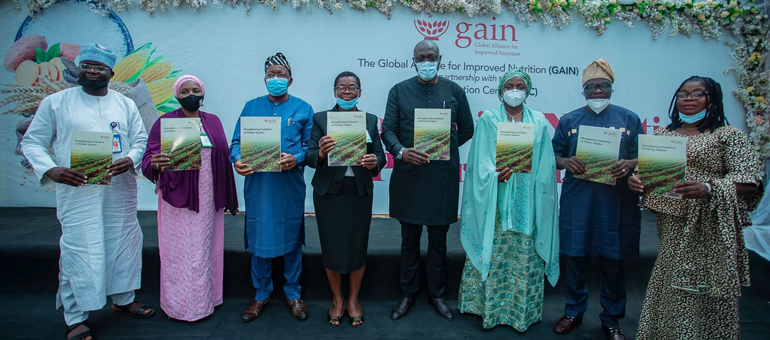The Global Alliance for Improved Nutrition, Nigeria (GAIN), launched the Strengthening Nutrition in Priority Staples (SNIPS) Project in Nigeria.
GAIN will partner with Deutsche Gesellschaft für Internationale Zusammenarbeit (GIZ) and the Green Innovation Centre for the Agricultural and Food Sector in Nigeria, with support from the German Government through the Federal Ministry for Economic Cooperation and Development (BMZ) to jointly implement the Project.
The 5-year project will be implemented in four states: Benue, Kaduna, Nassarawa and Oyo, to improve the access and consumption of safe and nutritious foods in Nigeria, particularly the consumption of four major priority staples – Cassava, Maize, Rice and Potato, thereby bringing forward innovations with the potential to contribute to smallholder farmer livelihoods and sustainable rural development.

GAIN Nigeria Country Director Dr. Michael Ojo(Centre) with other stakeholders during SNIPS project launch. © GAIN Nigeria.
The Project will achieve these outcomes through three key strategies:
- Workforce Nutrition,
- Biofortification and
- Business Support.
It is expected that these strategies will drive increased consumption of nutritious foods by smallholder farmers, their families, and the wider population; strengthen Vitamin A Cassava, Vitamin A Maize, Rice and Orange Fleshed Sweet Potato (OFSP) value chains and improve productivity and efficiency of farmers and other businesses to expand the production of nutritious foods in these priority staples value chains.
Ensuring food and nutrition security is one of the most pressing challenges for sustainable social and economic development in Nigeria. Meeting this need presents an important opportunity for tackling malnutrition. Diets of rural Nigerians are particularly poor, and many Nigerians currently experience vitamin and mineral deficiencies leading to severe health outcomes including premature and preventable death especially in under 5-year children.
Thus, the Strengthening Nutrition Project will build on the key pathways adopted by the country for the post-summit transformation of our food systems including biofortification, building the capacity of small and medium sized businesses through the business support component, and increasing the opportunities for women and young people to be engaged in profitable enterprise and for nutrition security through these interventions.